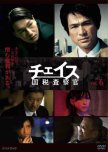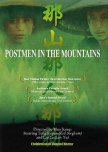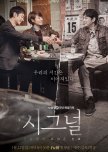
TL:DR: This is a fast-paced business-investigation drama driven largely by Arata and Eguchi, in which Arata shines offering a powerful performance. The context is tax evasion so you can expect some unfamilar jargon. Don't let it put you off; the context doesn't really prevent the viewer from getting into the flow of the narrative.
I was really unsure whether I would like this story. The first episode opened with this very specific context and language used threw me back a little. But as the story progressed I forgot about it and found a different focus: the fates of Eguchi and Arata. The context is still important, though. You also get to see just how far could people go to avoid paying taxes.
Eguchi plays the tax inspector here. The drama opens as he investigates the case that sparks the entire chain of events. Gradually, he is led to discover some rather precarious truths. He also has a personal interest in this investigation, which adds to his determination. Eguchi's presence on screen is very strong without being artifical; I had a sense that he was where he belonged, simply, as if being in that role was what he was meant to do. His character is relatively straightforward, a little too rigid at first and not terribly complex. He does eventually see that perspectives are relative and boundaries between them a little more fuzzy than he may have hoped. We follow him as he makes new discoveries and it's kind of fun to see what he makes of things and how he fumbles along the way.
But this show is actually a little less about him than about his antagonist, portrayed by Arata. Arata really shines in this drama, offering exceptionally powerful and emotional performace. His character is scarred in many ways. He's very human as we get to see. He's a very well-fleshed out antagonist who is as important to the story as Eguchi.
It's actually hard to call Arata an antagonist. The drama tries to avoid simplistic distinctions between good and bad and everything in the drama is questioned either by the characters themselves or by the characters who surround them as a result of events that unfold. Although we follow Eguchi in his investigation, Arata's perspective is strongly focalised as well to the point that we are driven to strongly empathise with him. For the most part it is Arata who holds all the cards and Eguchi is the one playing blind chase. However he gains control towards the end of the story. It makes the story balanced between the two of them. There is an element of revenge in this drama as well but it doesn't completely take over the story.
There is a quote in the drama which returns at least once or twice, like a haunting refrain: "One man's fire of despair is another man's fire of hope". The quote, to me, conveys several things: the sense of double narrative, the sense of simultaneity and chain links between actions and their effects. One man's actions are bound to affect the life of another; and what leads to despair for one, provides hope for another; the drama plays on how those two are closely intertwined and the fact thtat there is a thin line separating them. What is hopeful can become despair and despair can turn into hope.
While Arata and Eguchi carry the whole show, side characters are not unimportant since they meaningfully contextualise the frames of mind of both protagonists and highlight their strengths and weaknesses. It's particularly interesting to see how Arata's character treats and responds to the people around him.
The drama is also very good at creating ambience. They didn't use many camera tricks but when they did, I felt it was to meanigfully reflect the mood at a given point in time, to show a character'a tension or sadness. The music used is meant to be haunting. Pacing is even throughout the entire story. It starts fast and keeps going right towards the end. There are a lot of things happening all the time; the drama offers a good example of keeping good proportions between pacing and overall length of the story; no time is wasted.
The plus of this drama is that, like most Japanese dramas, it offers character motivations and backstories to bite into, but never becomes maudlin in doing so. Perhaps the ending may be seen as a little more teary in contrast to the rest of the drama but overall the ambience the drama has built throughout is never lost. I personally find the ending a bit abrupt but because of what happens there is not much left to tell either so to continue beyond the point in which the story ends may water down the impact of the whole narrative.
Much as I do rewatch dramas, it's always difficult to evaluate how rewatchable a drama is without actually rewatching it. I'd say once is enough for this one because the story is satisfying but I would rewatch it to see if I react to Arata in the same way and perhaps to see if I haven't missed any meaning-altering nuances. I am the type who likes to philosophize a little, so when I rewatch I look for the things I missed that could lead me to more meaningful speculations and debates.
I found this to be a very "meaty" story overall and Arata...Arata will likely haunt me from now on.
Cet avis était-il utile?

Postmen in the Mountains
9 personnes ont trouvé cette critique utile
This is a movie which beautifully relies on simplicity to tell an emotional tale. It's a quiet tale, full of feeling, full of longing. It's a deeply felt journey.
The gist of it is simple: China, 80s, the moutains of Hunan. A son is taking over the postman position of his father, who is forced to retirement due to arthritis. And for his first time doing it the father walks along, to teach him. The job is fairly simple: Walk a certain designated route, dropping mail in villages. But it's not that simple, because the postman must understand the villagers- and their hearts and the relationships among them.
It is a story of a father and son- and the understanding that passes between them of how much sacrifice this job entails. The son already kknows this and yet the journey together, the journey of passage for one and initiation for another- brings them to a point of transition and deeper understanding. This journey becomes a touchstone of both of their lives. It is a story of mutual appreciation, and of strenghtening the father-son bond but also increasing the love for the heart of the family, the mother, and her own sacrifices.
For anyone who knows and identifies with the joy but at the same time heartbreak of solitude and/or who enjoys solitary walks in the moutains, this movie may just prove a beautiful sight. For anyone who knows the separation from family for a long time due to a sense of duty or because of job, this may also be something to identify with.
It may not be a film for everyone, for it is slow, perhaps too slow, deliberate and reflective and lets feelings unfold on screen, though it speaks through facts and situations. It's a story of a father and son, the story of inheritance, the story of a journey of initiation and of sacrifice. It is accompanied with beautiful scenery and calming music- at times soaring with nostalgia which pierced right through me, beautiful cinematography, breathtaking at times, as we witness the wide expanses of the great moutains, the significane of the job in such a rural area becomes even more pronouces, as is the sacrifice. There is also some very intimate camera work at times.
It may seem very dated to some, however.
The acting is very sensitive and restrained from both actors and their bond feels very real; there is good character development as they learn more about each other The dog is also very prominent. The Chinese title of the film is "Those Mountains, Those People, That Dog", where the dog refers to the dog that accompanies our postmen on the way, a trusted companion, almost the second son, in the solitude of the long path that takes the postman away from home for many long weeks.
It's a thoroughly beautiful piece, which very much affected me the first time I saw it. I was very much taken by the painting the film created. For that reason alone, this movie will always be special for me.
Cet avis était-il utile?

It's a procedural, and not only technically...there are investigations of murders going on...famous cases, fictionalised. The protagonists belong to a unit dealing with cold cases, whose statue of limitations expired. So naturally, they have to dig into the past. ..and the story is presented both in the past and the present so we get two different stories but intextricably linked to one another, influenced by one another.. ..the cases seem separate at first...but then certain leads start pointing to the overarching story, whose main character is Lee Jae Han. He's a detective who as of the present day, has not been in service for some time. He binds past and present. We follow his story in the past, unravel the nystery behind him. and he definitely is the heart of the story, a link, a bridge that ties characters and events together. It's his story, in a sense. Thus, the story goes way beyond any regular procedural. There are investigations...investigations into the past...and then there is a character that is both a clue to that past and the main protagonist of his own story. Together with him, the young detective played by Lee Je Hoon and his team leader, we consider the impact of meddling with events and how our decisions cause other things to change... we see impact of those things on characters' memories and emotions....the sense of desperation that comes with wanting to change things and a sense of desperation that comes about when you discover what is involved in change and sometimes how win and loss strike each other out. There are abandoned places, unsolved riddles, - the overall mood of this drama is pitch perfect too. And we travel together with the protagonists to unravel nysteries that confuse and surprise them, that are of personal significance to them and thus emotional. It's chilling and exciting - great experience. But most dramas that are just "thrilling" get old very fast. For a drama to be a keeper, there needs to be more, some substance. This one has it. I really don't like any regular procedural - i find them too boring, too sentationalist and just too generic, they tend to lack the things i want from dramas. But this drama takes some part of that genre and fuses it intelligently with other things and as a result we have something trully unique. TvN dramas have long been my favourites...and here they prove it again. This is a drama with a quality far surpassing other dramas.
Then, there are rich personal backstories of the protagonists, who are all beautifully acted and whose stories are tightly related to one another....intertwined. Great cast, I really want to see dramas with as talented and well chosen cast as this one had..they made the characters very relatable, interesting and sympathetic. Lee Jae Han stands out for several reasons...he is the link to the past and the heart that binds other main protagonists to him and to one another in a meaningful way.. And he has quickly become one of my most beloved dramaland characters ever. He's very persevering, determined and has so much sympathy for people around him. There are strong themes of loyalty, of friendship, through the radio transmission and even a strong devotion between lee jae han and his "rookie".
Lee Je hoon's character is a brilliant, curious profiler and Kim Hye Soo a rookie-turned team leader. Both have strong ties to Lee Jae Han.. Kim Hye Soon;s side adds a personal and emotional perspective on Lee Jae Han himself, whereas Park Hae Young has leads to past cases.. many events in the drama have a profund impact on him and he does go through a change of his own. He and Lee Jae Han teach each other a lot and develop a unique friendship. The personal stories of all characters add emotional dimension to the cases. Unlike regular procedurals , this one weaves a strong overarching story that is bound by Lee Jae Han.
The writing quality is pitch perfect for me...there isn't anything crudely cartoonish, there is great flow that easily absorbed me, that characters are interesting and I care for them very much. The thing is there is a coherent, emotional story that adds depth and dimension to everything else.. I really rather liked the antagonists too, particularly one of them who seemed conflicted and it showed in his expressions. The characters are written and acted out in a way that strongly resonated with me and made love then,
Although the ending is open-ended, i believe this drama does NOT need a sequel. A sequel could just ruin it with something really lame. Future is uncertain...characters have a chance to make the most of that future - that's what the ending suggests. There is hope...as long as there is will....and as long as there is will, there is a way! Never give up on things that matter and for characters in this dramas, what matters is things set right and saving precious people, if possible...and not giving up on things. I'm very satisdied on all counts with this drama. Very, incredibly satisfying story.
Music is just great too, very moody, with several very haunting instrumentals. I love this! This drama is one rare case that I am happy to give a 10. Absolutely deserving. I am giving it a high rewatch value precisely because not the mystery counts as such but characters, implications and connections between them and for that, there are plenty moments to revisit for sure.
Cet avis était-il utile?

























